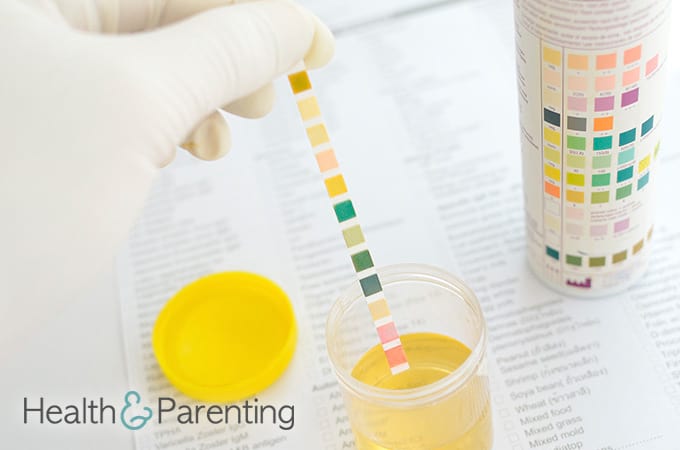At each prenatal visit, your healthcare provider will ask you to produce a urine sample. Your healthcare provider will perform a dipstick test on the sample, to check certain substances in your urine. This is a screening test which means it doesn’t diagnose a condition, but indicates if closer monitoring is warranted.
The dipstick test
Your healthcare provider will take your urine sample, and insert a specially treated chemical strip (a dipstick) into the sample. Patches on the dipstick will change colour to reveal the presence of protein. The dipstick test also reveals glucose levels, these are used to screen for gestational diabetes.
It is generally nothing to worry about if the test detects trace levels of protein in your urine, unless you are showing other symptoms of an associated condition. Your protein output changes throughout the day, and can be affected by diet and fluid intake.
Causes of excess protein in urine
The dipstick test shows how much protein is present in your urine, and this is classified from + (low) to ++++ (high). A high grading especially in later pregnancy can indicate pre-eclampsia, a serious condition that requires close monitoring. An underlying problem such as kidney damage may also cause a high protein output in pregnant women. A low grading is usually indicative of a urinary tract infection.
If a urinary tract infection is suspected, your healthcare provider will send your urine to the lab for more precise testing. One urine sample may suffice, or you may be asked to collect all urine output over a 24 hour period. At the lab, your sample will be tested for bacteria and then antibiotics will be recommended. If you are showing other symptoms of a urinary tract infection, your healthcare provider may prescribe antibiotics before the lab results are back.
Is it pre-eclampsia?
In a lot of cases, the cause of protein in urine during pregnancy will not be pre-eclampsia. However, because of the severity of this condition, it is important you know how to recognise the signs.
You should contact your healthcare provider if you notice any of the following symptoms:
- high blood pressure
- protein in your urine
- vision problems (blurred vision or flashing lights)
- sudden swelling of the hands, face and feet
- pain in the upper abdomen
- headaches
- vomiting
- feeling generally unwell
Written by Fiona, proud owner of a toddler, @fiona_peacock
This information is not intended to replace the advice of a trained medical doctor. Health & Parenting Ltd disclaims any liability for the decisions you make based on this information, which is provided to you on a general information basis only and not as a substitute for personalized medical advice. All contents copyright © Health & Parenting Ltd 2018. All rights reserved.










